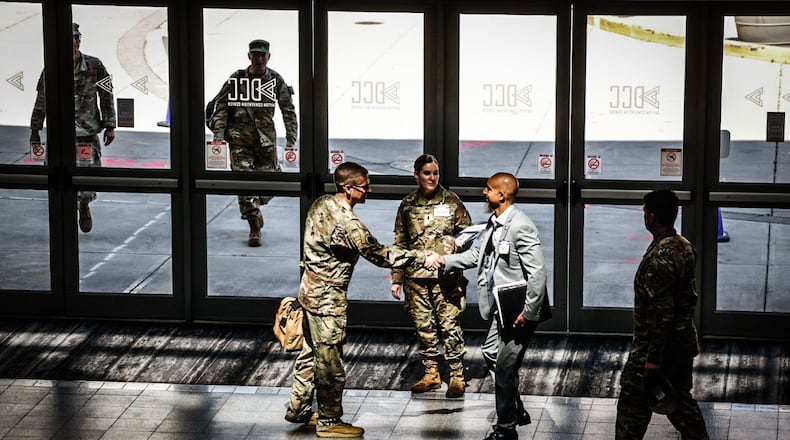Restating what for him has been a familiar theme since 2020, the author of the “Accelerate Change or Lose” doctrine added: “You must get comfortable being uncomfortable.”
Dubbed “LCID,” the three-day Life Cycle Industry Days event is one of the premier events connecting the defense industry to the teams of people at Wright-Patterson Air Force Base (and beyond) who acquire and sustain aircraft, tools and weapons.
Credit: JIM NOELKER
Credit: JIM NOELKER
It’s the eighth LCID for the Air Force Life Cycle Management Center, or AFLCMC, which is headquartered at Wright-Patterson.
AFLCMC is part of Air Force Materiel Command (also based at Wright-Patt), responsible for equipping the Air Force with new planes, tools and weapons and then sustaining that equipment across its life span.
The theme for this year’s event is meeting Air Force operational imperatives on an array of weapons. Every AFLCMC program executive officer is expected to be on hand over the next few days in Dayton to meet with attendees, one-on-one or in panel discussions.
Steven Wert, AFLCMC program executive officer for digital, told media at the event that there is growing foreign military interest in the new E-7A airborne battle management aircraft, for which the Air Force earlier this year awarded Boeing an initial contract not to exceed $1.2 billion.
The new E-7s are meant to replace the E-3 AWACs (airborne warning and controls system) aircraft, the first of which were retired this spring at the Boneyard at Davis-Monthan Air Force Base, Arizona.
The United Kingdom, South Korea and Turkey are also eyeing the new plane.
“We may be very busy,” Wert said, referring to Air Force expectations for the new E-7s. The service plans to purchase 26 of them in total.
Wert also discussed the Air Force’s new approach to crafting software, moving away from perfecting hundreds of technical software requirements to focusing on what can be done soonest and building on that.
Software “factories” such as Kessel Run in the Boston area and Hangar 18 near Wright-Patterson have played a role in that.
“We’re not doing software stupid any more,” Wert said.
There remain challenges on a number of fronts. The Department of Defense has delayed accepting some new F-35s this year in an effort to get the plane’s software to work with new fighter hardware. One issue Wert identified is that some F-35 software has at its basis technology that’s 20 years old.
“It’s just a challenge,” Wert said.
Gen. C.Q. Brown Jr. on:
Artificial intelligence: “It’s not going to solve all of our problems. It can’t be the end-all, be-all.”
Dealing with bureaucracy: “By being directly involved, that’s how you break down bureaucracy.”
On how classified the Air Force is: “We know what we want to move away from, but we can’t talk about what we want to buy because we’re so classified.”
About the Author



